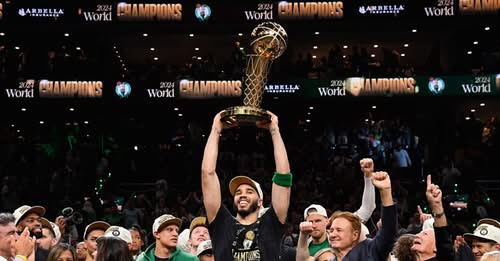The Boston Celtics are undeniably one of the most iconic and storied franchises in the history of the National Basketball Association (NBA). Their legacy is steeped in triumph, tradition, and a deep connection with the sport’s evolution over the decades. The Celtics’ record 18 NBA championships, including their most recent title in 2024, solidify their place not just in basketball history but in the wider world of professional sports as a whole. This legacy began long before their latest championship, tracing back to the roots of the NBA and the original dominance that shaped much of the league’s early narrative.
Founded in 1946, the Celtics quickly became a symbol of excellence. From their earliest days, the team was dedicated to building a culture centered around winning and innovation. Boston’s team owner, Walter Brown, helped bring the Celtics into the Basketball Association of America, which would eventually become the NBA. However, it was the arrival of Red Auerbach as head coach and general manager in 1950 that set the franchise on a path toward greatness. Auerbach’s basketball mind and leadership style revolutionized the team’s approach, emphasizing teamwork, fast breaks, and strong defense—principles that would become hallmarks of Celtics basketball.
The Celtics’ dynasty truly took shape during the late 1950s through the 1960s, a period that is often regarded as one of the most dominant eras for any sports franchise. With legendary players like Bill Russell, Bob Cousy, Tommy Heinsohn, and later John Havlicek, the Celtics won an astonishing 11 NBA championships in 13 seasons, a feat unmatched by any team before or since. Bill Russell, in particular, stood out as a transformative figure. Known for his defensive prowess, leadership, and competitive spirit, Russell won 11 titles during his career, the most by any player in NBA history. His rivalry with Wilt Chamberlain and other greats of the era not only enthralled fans but also pushed the league to new heights in terms of skill and competition.
This period of Celtics dominance also coincided with broader cultural and social changes in America, and the team played a significant role beyond just basketball. The Celtics were one of the first teams to fully embrace racial integration, with Bill Russell becoming one of the first African American superstars in professional basketball. The team’s commitment to diversity and inclusion helped set a precedent for other franchises and contributed to the NBA’s reputation as a progressive and inclusive league. This aspect of the Celtics’ history remains a critical part of their identity, reflecting values that go beyond mere championships.
After the Russell era ended, the Celtics experienced some ups and downs but continued to be competitive throughout the 1970s. The team won two more championships in 1974 and 1976, led by stars such as John Havlicek, Dave Cowens, and Jo Jo White. These teams were characterized by their gritty play, teamwork, and resilience, traits that had become synonymous with Boston basketball. Although they didn’t dominate quite as completely as in the Russell years, the Celtics remained a formidable force, always capable of making deep playoff runs and contending for titles.
The 1980s brought a new wave of Celtics greatness, fueled by one of the most famous rivalries in NBA history—the Celtics versus the Los Angeles Lakers. This era was defined by the legendary trio of Larry Bird, Kevin McHale, and Robert Parish. Larry Bird, in particular, became the face of the franchise and one of the greatest players ever to step on a basketball court. Bird’s combination of shooting, passing, rebounding, and basketball IQ made him a uniquely complete player who could dominate games in multiple ways. Under Bird’s leadership, the Celtics won three championships in 1981, 1984, and 1986, further cementing their legacy as a winning franchise.
The battles between the Celtics and Lakers in the 1980s helped elevate the NBA’s popularity around the world. These two teams, with contrasting styles and personalities, engaged in epic Finals matchups that captured the imagination of fans everywhere. The Celtics’ hard-nosed, team-oriented approach contrasted with the flashy, fast-paced Lakers led by Magic Johnson. These rivalries not only generated immense excitement but also contributed to the global growth of basketball as a sport and cultural phenomenon.
Following the Bird era, the Celtics faced a period of rebuilding and relative struggle in the 1990s and early 2000s. During this time, the franchise worked to find new stars and redefine its identity. While they never quite reached the same heights as in the past, the Celtics remained a respected and important team in the league. It wasn’t until the mid-2000s that the Celtics began to regain their status as a championship contender. The acquisition of key players like Paul Pierce, Kevin Garnett, and Ray Allen created a new “Big Three” that transformed the Celtics into an elite team once again.
This new Celtics team, led by Pierce’s scoring ability, Garnett’s defensive intensity, and Allen’s sharpshooting, captured the NBA championship in 2008. This victory was particularly meaningful because it ended a 22-year championship drought and reaffirmed Boston’s place among the NBA’s elite franchises. The 2008 championship team was marked by its toughness, defensive prowess, and unselfish play, reflecting the Celtics’ long-standing basketball philosophy. The success of this team helped rekindle the passion of Celtics fans and inspired a new generation to embrace the team’s storied history.
In the years following the 2008 title, the Celtics experienced some challenges as the core of their championship squad aged and injuries took a toll. Yet, the franchise remained committed to building a competitive team through smart drafting, savvy trades, and excellent coaching. The Celtics have always been known for their ability to adapt and rebuild while maintaining high standards, and this approach helped them remain relevant in the league even during transitional periods.
This strategy paid off in the 2020s when the Celtics emerged as one of the NBA’s most talented and exciting teams. Young stars such as Jayson Tatum and Jaylen Brown provided the foundation for a new era of Celtics basketball. These players combined skill, athleticism, and a competitive fire reminiscent of the franchise’s greatest teams. Under the guidance of coach Ime Udoka and later Joe Mazzulla, the Celtics cultivated a team-oriented style that emphasized defense, pace, and versatility, echoing the principles laid down by Auerbach and carried on by legendary players before them.
The culmination of this effort was the Celtics’ 18th NBA championship in 2024, a historic achievement that underscored the team’s enduring greatness. Winning this title required overcoming fierce competition from some of the league’s best teams, highlighting the Celtics’ resilience and championship pedigree. The 2024 championship was not only a triumph on the court but also a celebration of the franchise’s rich history and the passionate fan base that has supported the team through thick and thin. This victory further enhanced the Celtics’ reputation as the most successful franchise in NBA history in terms of championships.
Beyond just the titles and individual stars, the Celtics have had an enormous impact on the culture of basketball and the NBA itself. Their commitment to teamwork, defense, and unselfish play has influenced countless teams and players over the years. The Celtics’ ability to integrate young talent with veteran leadership continues to be a model for success. Moreover, the franchise’s connection to the city of Boston and its fans is deeply rooted in pride, tradition, and community. Celtics games at the TD Garden are known for their electric atmosphere, reflecting the passion and loyalty of their supporters.
The Celtics’ story is also one of innovation and adaptation. From pioneering the fast break and defensive schemes under Auerbach to embracing modern analytics and player development, the franchise has always sought ways to stay ahead of the curve. Their front office has consistently been recognized for its savvy decisions in drafting, trades, and coaching hires. This willingness to evolve while respecting tradition is part of what keeps the Celtics relevant in a constantly changing NBA landscape.
In summary, the Boston Celtics’ journey through NBA history is a remarkable tale of sustained excellence, resilience, and cultural significance. Their 18 championships, including the latest in 2024, are a testament to a franchise that has not only won more than any other but has done so with style, grit, and heart. From the Bill Russell era to the Larry Bird years, from the 2008 “Big Three” to the young stars of today, the Celtics have embodied the spirit of competition and the pursuit of greatness. Their story is woven into the very fabric of the NBA, representing the past, present, and future of basketball excellence. Whether through legendary players, unforgettable rivalries, or passionate fans, the Boston Celtics continue to be a beacon of what it means to be a truly historic and successful franchise in the world of professional sports.



